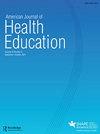年轻人的牙齿卫生行为:使用计划行为理论(TPB)的调查的系统回顾
IF 0.8
Q4 PUBLIC, ENVIRONMENTAL & OCCUPATIONAL HEALTH
引用次数: 1
摘要
背景牙病与慢性健康状况以及心理和社会幸福感下降有关。年轻的成年期表现出关键的阶段,因为在这段时间内发展和实践的牙齿卫生行为会持续到以后的生活中。计划行为理论(TPB)是一种常用的理论框架来检查意图从事牙科行为。目的系统总结利用TPB问卷评估青年人群口腔卫生行为预测因素的研究成果。方法采用四阶段的文章识别流程,确保文章符合纳入标准。采用质量评价法评价问卷构建方法。结果12篇文章符合纳入标准。除了TPB结构外,每个研究都纳入了补充预测因素,如口腔健康知识和预期的社会结果。本系统综述的证据表明,TPB是设计评估年轻人口腔卫生行为问卷的有用理论框架。健康教育专家应该管理使用TPB和TPB相关结构的口腔卫生行为调查,以更好地了解与年轻人改善口腔卫生行为意愿相关的因素。本文章由计算机程序翻译,如有差异,请以英文原文为准。
Dental Hygiene Behaviors among Young Adults: A Systematic Review of Surveys Using the Theory of Planned Behavior (TPB)
ABSTRACT Background Dental diseases are associated with chronic health conditions and decreased psychological and sociological wellbeing. Young adulthood presents a pivotal stage as dental hygiene behaviors developed and practiced during this time persist into later life. The Theory of Planned Behavior (TPB) is a commonly used theoretical framework to examine intention to engage in dental behaviors. Purpose To systematically summarize research studies using TPB questionnaires to assess predictive factors of oral hygiene behaviors among young adult populations. Methods A four-phase article identification process ensured articles met the inclusion criteria. Quality appraisal assessments were used to evaluate questionnaire construction methodology. Results Twelve articles met the study’s inclusion criteria. Each study incorporated supplemental predictive factors such as oral health knowledge and expected social outcomes in addition to the TPB constructs. Discussion Evidence from this systematic review suggests that TPB is a useful theoretical framework for designing questionnaires that assess dental hygiene behaviors of young adults. Translation to Health Education Practice Health education specialists should administer oral hygiene behavior surveys that utilize TPB and TPB-related constructs to better understand factors associated with improved intentions toward dental hygiene behaviors among young adults.
求助全文
通过发布文献求助,成功后即可免费获取论文全文。
去求助
来源期刊

American Journal of Health Education
PUBLIC, ENVIRONMENTAL & OCCUPATIONAL HEALTH-
CiteScore
1.70
自引率
10.00%
发文量
36
期刊介绍:
AJHE is sponsored by the American Association for Health Education of the American Alliance for Health, Physical Education, Recreation and Dance. The mission of the American Association for Health Education(AAHE) is to advance the profession by serving health educators and others who strive to promote the health of all people through education and other systematic strategies.AAHE addresses the following priorities •Develop and promulgate standards, resources and services regarding health education to professionals and non-professionals •Foster the development of national research priorities in health education and promotion. Provide mechanisms for the translation and interaction between theory, research and practice.
 求助内容:
求助内容: 应助结果提醒方式:
应助结果提醒方式:


